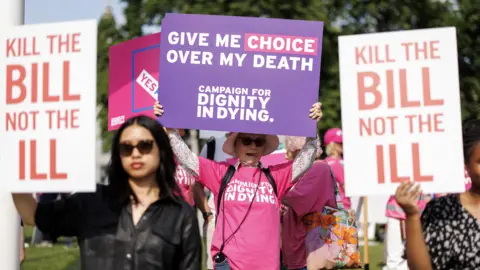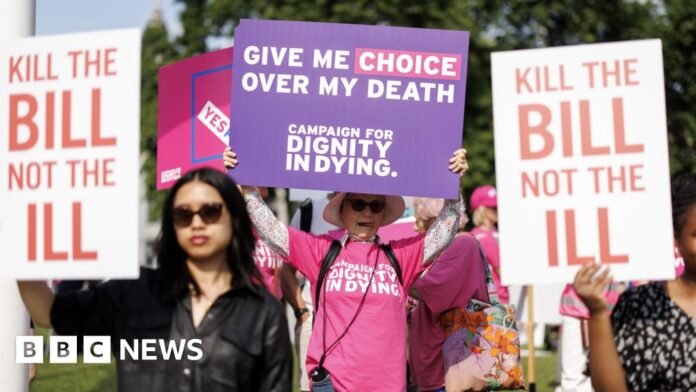Political reporter
 EPA-EFE/Shutterstock
EPA-EFE/ShutterstockKim Leadbeater, the MP behind the assisted dying bill, has said she is “confident” MPs will back the legislation when it returns for its final stage in the House of Commons on Friday.
If the Terminally Ill Adults (End of Life) Bill – which allows terminally ill adults to get medical assistance to end their own lives – is approved it will then go to the House of Lords for further scrutiny.
MPs gave the proposal their initial backing in November, with 330 MPs voting in favour and 275 against.
But debate over the bill has become increasingly fractious and since last year at least a dozen MPs who backed or abstained on the bill had said they were likely to oppose it.
On Thursday, a further four Labour MPs said they were switching sides to oppose the bill.
Markus Campbell-Savours, Kanishka Narayan, Paul Foster and Jonathan Hinder said the bill had been “drastically weakened” since last year’s vote.
In a letter to colleagues, they warned that safeguards in the bill were “insufficient” and would “put vulnerable people in harm’s way”.
Speaking at a press conference in central London, Leadbeater said the bill was “the most robust piece of legislation in the world”.
She said it had got a “good majority” of 55 in November, adding: “There might be some small movement in the middle, some people might change their mind one way, others will change their mind the other way.
“But fundamentally, I don’t anticipate that that majority would be heavily eroded. So I do feel confident we can get through tomorrow successfully.”
She added that if the bill didn’t pass, it “could be another decade before this issue is brought back to Parliament”.
Some MPs have complained that the bill had not been given enough scrutiny and earlier this week 50 Labour MPs urged the government to allow more time for debate.
Leadbeater insisted it was “not being rushed through”, adding: “This has been going on since November. This is not a quick thing that’s happened overnight. It has gone through hours and hours and hours of scrutiny.”
As is usual for matters of conscience, MPs will get a free vote, meaning that they do not have to follow any particular party line.
Prime Minister Sir Keir Starmer voted in favour of the bill last year and has indicated that he will do so again on Friday.
Earlier this week he told reporters his position was “long-standing and well-known”.
Conservative leader Kemi Badenoch has said that although she had previously supported the principle of assisted dying, she would not vote for the bill.
“This bill is a bad bill. It is not going to deliver. It has not been done properly,” she said.
“This is not how we should put through legislation like this. I don’t believe that the NHS and other services are ready to carry out assisted suicide, so I’ll be voting no, and I hope as many Conservative MPs as possible will be supporting me in that.”
Broadcaster Esther Rantzen, who is terminally ill, has been a vocal supporter of the bill. She said it would help those “for whom life has become unbearable and who need assistance, not to shorten their lives but to shorten an agonising death”.
Leadbeater’s bill would let terminally ill people end their life if they:
- are over 18, live in England or Wales, and have been registered with a GP for at least 12 months
- have the mental capacity to make the choice and be deemed to have expressed a clear, settled and informed wish, free from coercion or pressure
- be expected to die within six months
- make two separate declarations, witnessed and signed, about their wish to die
- satisfy two independent doctors that they are eligible – with at least seven days between each assessment.
Since the first vote in November, the bill has been scrutinised and amended.
Originally the bill said a High Court judge would have had to approve each request to end a life.
However, this has now been replaced by a three-person panel including a senior legal figure, a psychiatrist and a social worker.
Other changes include doubling the maximum time allowed between the bill being passed and becoming law from two years to four; allowing health workers to opt out of the process and introducing a ban on advertising assisted dying services.
The bill will only become law if it is approved by both MPs and peers in the House of Lords.







